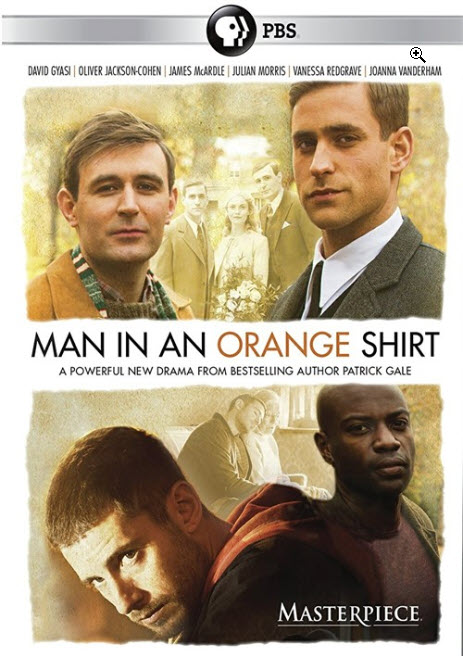(2018, 112 min)
Country: U.K.
Director: Michael Samuels
Studio: PBS Home Video
Language: English
SYNOPSIS: In 1944, British Army Captain Michael Berryman meets the artist Thomas March in Southern Italy. Despite the fact he has a young fiancÚ waiting for him back at home, straight-laced Michael finds himself falling for Thomas' bohemian charms. When the war ends they steal some time away at Michael's secluded cottage, where they briefly experience life as a couple and Thomas paints Michael's portrait, 'Man In An Orange Shirt'.
Against Thomas' protestations, Michael then returns to the very different life in London he left before the war - back to marriage, and plans to start a family. Thomas returns to the relative freedom of Soho where, at great personal risk, he can live the life of a gay man. Will their old lives be enough to satisfy Michael and Thomas in the wake of what they had before? Or can they find a way for their love to survive against the pressures of conventional marriage, 1940s society, and the law?
REVIEW:
To celebrate the 50th anniversary of the decriminalization of homosexuality in Britain, the BBC has a Gay Britannia season and the show that is fascinating the Brits is "Man in an Orange Shirt" written by Patrick Gale and loosely based on what he discovery he made about his parents' relationship.
It is the wrenching story of a secret romance between soldiers Michael (Oliver Jackson-Cohen) and Thomas (James McArdle), and the increasingly frayed marriage of Michael and his new wife Flora, whom he marries because in the 1940s that's just what people did. When Thomas becomes upset after being asked to be Michael's best man, Michael tells him that the two of them could never have set up a home together. This is a sad and human story of people trying to do their best when the times that they live in gives them no options.
Much of the tension is due to Michael's inability to move beyond the life that is expected of him and Thomas' inability, or unwillingness, to toe the line. Both positions are sympathetic. Thomas is angry and defiant, beaten down and wounded by imprisonment and injustice and everyone in this drama is so angry. It should make us angry, too, as he see the outrageous unfairness of imprisoning gay men at a very recent time in Britain's history.
Even in the early scenes of happiness and bliss in countryside cottage are tinged with the inescapable sadness because that existence is a temporary fantasy that cannot be sustained. It is made even more heartbreaking by the proximity of happiness. Just 20 years later, and it might all have been different. The tragedy of Thomas exiling himself to France, to "drink himself to death in the sun"; the tragedy of Flora being trapped in a marriage without love; the tragedy of Michael doing what he believes is right and proper might have caused the beginning of to shift just enough to allow a bit of happiness to shine through. We see a compassionate evocation of how sexuality is contorted when criminalized. It was a time when attraction and affection were covert.
Scriptwriter Patrick Gale sets his story in the historical context that pushes gay passion into dark corners, yet without making romance feel dirty. The most daring thing about the drama is how it reaches its own accommodation between a blameless love and a painful history. It is a difficult to repurpose, sex that was instigated in public toilets (cottages), since it has become something more synonymous with celebrity scandals than love affairs. That makes Gale's inclusions more boldly fascinating. His secret lovers are Michael, an army captain and Thomas, a wounded soldier and artist who first met in Italy when Thomas needed assistance relieving himself behind a tree.
Their romance develops in secret in a country cottage, where Thomas paints his lover as a faceless man in a doorway. They have passionate, aggressive confrontations in a bathroom during Michael's wedding. And later, separated by this hollow marriage, they both visit notorious public lavatories, landing Thomas in jail for gross indecency. What else can they do?
The betrayal of Michael's wife Flora (Joanna Vanderham), though, is a more conventionally pitiable and somehow treated less sympathetically. When Michael returns home at the end of the war, his first visit is to Thomas, and their passionate affair is a cause for Flora's heartbreak. Flora switches abruptly from naif to harridan, discovering her husband's love letters and burning them, a bitter victim denied her own chance at passion. Though she can barely understand her husband's orientation, it is she who finally makes the compromise and she becomes a martyr of denial. She tells Michael that she does not ever want to hear the details and they will never talk about it. She seems distant to us but there was nothing else that she could do.
They never addressed the secrets and this is the tragedy of the drama. While Michael and Flora are packing their child off to boarding school, he is still darting after strangers into restrooms. In the second part that is set 60 years later we still wonder what took place. There is drama and understanding, however belated, in bringing these hidden lives out to where they can be seen.
There is only part of Gay Britannia. There is also "Queers", a series of monologues written and performed by familiar faces, with two new editions appearing every night. The first, and best, is written by Mark Gatiss and has Ben Whishaw as another soldier in love with an officer, this time in 1917. There is also Michael Dennis's story of a trip to London in 1994 in which he memorably calls homophobic politicians "desiccated twats".
-- Review by Amos Lassen (https://reviewsbyamoslassen.com)




